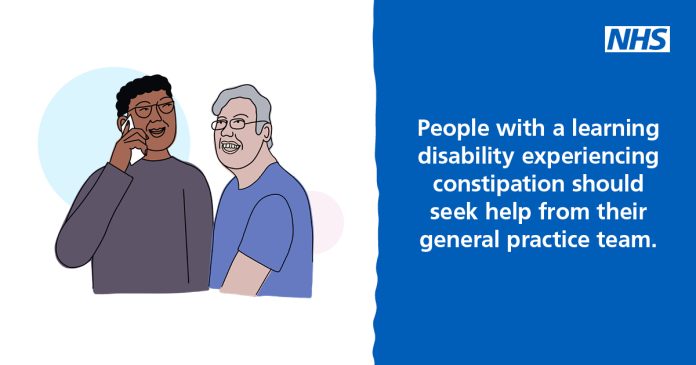The NHS has today launched a major new national campaign to support people with a learning disability, healthcare professionals and carers to spot the early signs of potentially life-threatening constipation.
The campaign, which has been co-created with people with lived experience, launches today with a new animation and posters for use in different care settings to support conversations about constipation and ensure people with a learning disability can receive treatment at the earliest opportunity.
Those with a learning disability are more likely to be constipated than the general population, while also being less likely to recognise the signs and be able to communicate their symptoms effectively, increasing the risk of serious complications and even death.
Research carried out by LeDeR, an NHS-funded service improvement programme for people with a learning disability and autistic people, shows only 10% of the general population experience the condition while up to 50% of people with a learning disability are affected.
The study also found constipation was one of the 10 most frequently reported long-term health conditions among people with a learning disability who died in 2020. More than a third of those whose deaths were reviewed in the 2020 annual report were usually prescribed laxatives.
But from today a major new NHS campaign is underway to raise awareness of the symptoms among those with a learning disability, primary care professionals and paid and unpaid carers, aiming to help prevent severe constipation.
The campaign will use a suite of new resources that have been developed in partnership with the Down’s Syndrome Association, Mencap and Pathways Associates to support different audiences.
It comes after a review by LeDeR and South West NHS, which found that better recognition and management of constipation may significantly cut hospital admission and improve quality of life.
Anne Worrall-Davies, interim National Clinical Director for Learning Disability and Autism, said: “Reviews into the deaths of people with a learning disability have shown us that far too many people are unnecessarily developing serious health conditions, with some even dying from constipation.
“That’s why our new campaign is so vital to support people with a learning disability, as well as their carers and primary care professionals, to identify the early signs of constipation and ensure they can receive the medical treatment they need at the earliest opportunity.
“Constipation can have a major impact on quality of life for so many people, and it can be really challenging for carers to recognise as they may not know the signs or may attribute the resulting behaviours to the person’s learning disability. But thanks to these new campaign resources, we hope to make the signs and symptoms easy to spot so that treatment can begin as soon as possible, reducing the risk of hospitalisation and helping save lives.”







